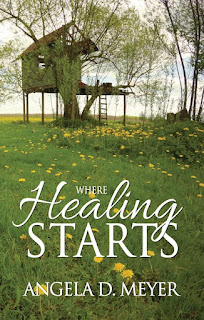(A Writing Tips post)
by Angela D.
Meyer
Wordiness stalls your
reader at best and loses them completely at worst.
When you’re editing
and you come across a section that sounds wordy or you’re over
word count and can’t figure out where to cut, here are 7 trouble spots to
avoid to ensure your writing is clear and as concise as your story
needs to be. (edited from 46 words to 27 words.)
Redundancy. When
you edit, look for these spots where you repeat the same idea with different
verbiage, then choose the best way you worded it and delete the others.
Passive construction. Passive construction adds words to your writing and
can be cumbersome. It has its place, but use it carefully and with intent.
For example:
Passive: The
boy was bitten by a mosquito. The bite made the boys skin itch. (14 words)
Active: A
mosquito bit the boy. His skin itched. (8 words)
Since passive construction
is where the action is done to the subject, a search-and-find of the word “by”
in your manuscript may help you spot passive construction. Decide if the
passive construction serves a specific purpose or effect in your story. If not,
then make it active.
Repetitiveness:
I find at least one word in each story that communicates an idea so well I use
it repeatedly. I also have a group of more common words that I tend to overdo
and have to catch in the editing stage. Using the same word multiple times
indicates I may be getting lazy in my writing and allowing wordiness to creep
in.
A quick search-and-find helps
locate these pesky terms. I watch especially for clusters which make them stand
out. For story specific words, I choose a different word or cut it out
entirely. For the common words that I see across all my stories, I may have to
change up the construction of the sentence.
A few common overdone
words include: that, very, so, can and just. Much of the time deleting these
words does the trick. Read the following sentence and see the difference taking
out a few words can make.
I heard that he was
going to college and I am so very thankful that he is just so
willing to lead the way. (24 words vs. 18 words)
Telling your readers what you’re going to do instead
of doing it.
I could have gone to the
store. Vs. I went to the store.
I am thinking about
getting a new maid. VS I will hire a new maid.
I am going to go the store.
Vs. I will go to the store.
Overuse of “-ing” words. “-ing” words can be vague about who or what they
modify and often indicate weak verbs.
Make sure your subject is
clear.
Vague: Mary
hurried away from the store leaving her
cart full of groceries. (Did the store leave her cart or did Mary?)
Clear:
Leaving her cart full of groceries, Mary hurried away from the store.
Make sure you are using
strong verbs.
Weak: Working at the store
is a great job.
Strong: I enjoy working at the store.
Overuse of -ly words. Instead of “walked lazily” use “shuffled.” The
occasional adverb can add color, but when there is an overabundance, it alerts
you to possible weak verbs.
Super long sentence: It helps the rhythm of your story to vary the lengths of the
sentences, but a too-long sentence can make a reader feel like they can’t catch
their breath. It also slows the pace of your story. Unless you’re are using a
long sentence for effect, generally, 20-25 words is a good length. In addition
to checking the trouble spots already mentioned, check punctuation for run-on
sentences. If not a run-on, break it up into more than one sentence.
This is not an all-inclusive list of trouble spots to
avoid on the way to clear and concise writing. Do you have a pitfall you have
to watch out for?
Angela D. Meyer, author of The
Applewood Hill Series, lives in NE with her husband of 25 years and their high
school daughter. Their son serves our country in the Marines. Angela enjoys
hanging out with her family, reading, connecting with friends and encouraging
women to grow in their faith. One of her dream spots to vacation is next to the
ocean and someday she wants to ride in a hot air balloon.
Connect with Angela:
WHERE HEALING STARTS
Joanna, full of bitterness over the
past, can no longer ignore the growing storm inside her and is bent on
self-destruction as she seeks to ease her pain. But the refuge she seeks is
always out of her reach.
Her brother Blake must choose between
what has always been safe and what he has always wanted. One mistake after
another leads him down a dangerous path.
The one for all, all for one sibling
bond can’t help them now. They are both determined to hang onto their anger,
never forgetting. Never forgiving. They see no reason to trust God.
After so many years of turmoil, will
the Hannigan siblings find refuge in the God who loves them? Or will they get
lost along the way?





Welcome to Chirp 'N Chatter, Angela! I enjoyed your post - lots of good information and tips!
ReplyDelete